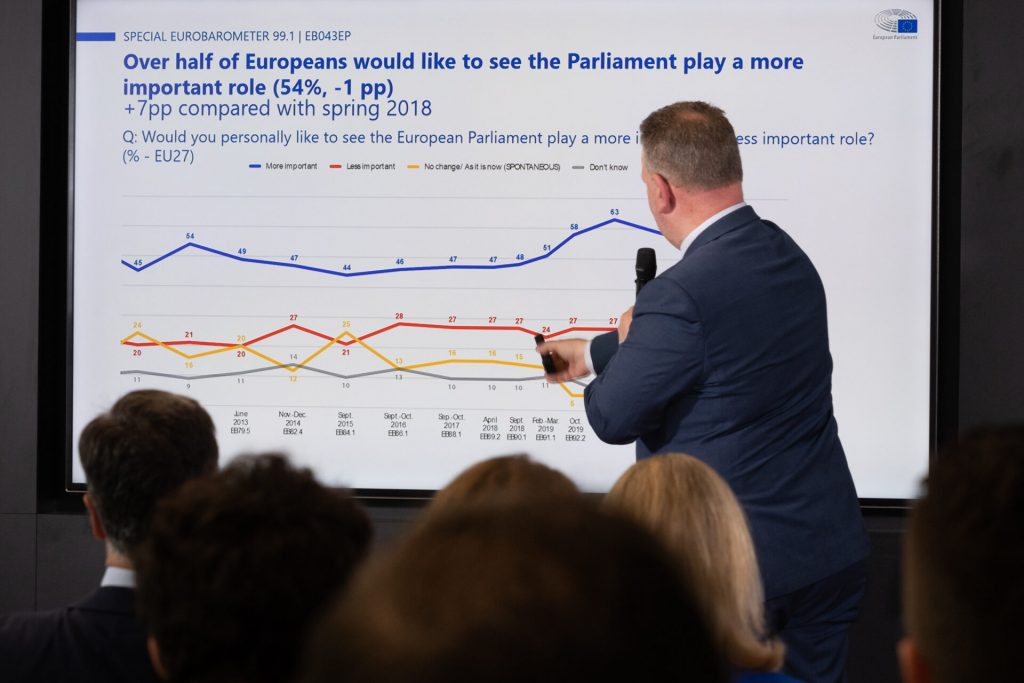 Have the article read by OpenAI (Beta). Please note that AI translations may take some time to process.
Have the article read by OpenAI (Beta). Please note that AI translations may take some time to process.The figures contained in the Spring Eurobarometer, published on Tuesday exactly one year ahead of the 2024 EU elections, show increased levels of interest in and awareness of these elections, as well as of the impact of the European Union on everyday life. The next EU elections are to be held on June 6-9, 2024, when the current five-year term ends.
The higher interest is probably linked to the increased visibility of the EU in recent years due to multiple crises including the Covid-19 pandemic and Russia’s war on Ukraine, European Parliament spokesman and Director General for Communication Jaume Duch Guillot said.
The president of the European Parliament, Roberta Metsola, stressed the importance of the EU elections when she announced the results of the Eurobarometer via video message at a press conference in Brussels organised by the European Newsroom (enr). She said that taking part in the elections was a chance to stand up for all the issues important to EU citizens. She called on “everyone, especially young people, to vote and in doing so shape the Union they want to live in”.
According to Jaume Duch Guillot, young Europeans must realise that the 2024 EU elections will influence the EU for the next decade and will have a key impact on their lives.
Are voters ready to vote?
Sixty-seven percent of Europeans said they would be likely to vote in European Parliament elections if they were held next week. Ahead of the previous polls in 2019, 58 percent said they were interested in voting and the actual turnout ended up at around 51 percent. The willingness to vote varies across Europe:
In Belgium, where compulsory voting applies, 73 percent of respondents said that they would vote. A total of 58 percent of Slovenian voters said they would likely cast a vote in the European elections if they were held this week, nine percentage points below the EU average. Slightly more than half of Croatia’s voters (53 percent ) said they would likely go to the polls if the European elections were held next week. Only the Czech Republic recorded a lower score than Croatia with 50 percent of its citizens saying they would be likely to vote if the elections were held next week.
According to the survey, 64 percent of Italians said they would be likely to vote if the European elections were held any day, a figure slightly lower than the EU average. Italy is among the countries where interest in European politics has grown the most since the Ukraine war and the pandemic, rising from 47 percent in 2018 to 58 percent today, higher than the EU average of 56 percent.
Asked what motivated them to go out and vote in European elections, most respondents cited a “civic duty” to cast their ballot, the habit of voting in elections and the desire to support a political party. These three factors came above “wanting to change things”, supporting a specific candidate or expressing support for the EU.
In contrast, reasons that keep turnout in European elections lower than in other elections at national level include the belief that a vote will not change anything, a lack of interest in politics in general and distrust of politics, as well as a belief that what happens in the European Parliament “does not concern them.” The majority of Bulgarians (57 percent), for example, are uninterested in the European elections that will take place in June 2024.
Slovakia has always had the lowest voter turnout in previous European Parliament elections. Even though the Slovaks’ interest in European Parliament elections has risen since the last vote – with the survey showing that 26 percent of Slovaks are interested in voting in the 2024 elections – the figure still puts Slovakia in last place again in terms of voter turnout.
Asked what Slovaks need to do to reverse this unfavourable trend, Duch Guillot said that a “domestic solution” is mainly in the hands of politicians, the government, the parliament and the media. “People still trust the media, or some part of the media, the most. They should learn the lessons of the last four to five years, when the EU’s actions in various crises have had a clear impact on people’s daily lives,” he said.

Support for Ukraine boosts the figures
Duch Guillot noted that the EU had dealt with the impact of Brexit, the coronavirus crisis and the need to ensure that the population was vaccinated and economies recovered after the pandemic. Currently, it was responding unitedly to Russia’s aggression against Ukraine.
“All these elements show that the EU is much more important to people today than it was five years ago, meaning that the importance of the European Parliament and its members has grown and will continue to grow,” said Duch Guillot.
More respondents approved of the EU’s support for Ukraine, with an average of 76 percent across the bloc. Approval rates, however, differed between member states. In Sweden, 97 percent backed the EU’s help for Ukraine, compared with 51 percent in Slovakia and 68 percent in Germany. Sixty-one percent of Italians viewed EU support for Ukraine favourably. Support for Ukraine in Bulgaria was 54 percent and disapproval was at 39 percent.
Cost-of-living crisis drags down satisfaction
Cost-of-living woes are focusing European voters’ minds one year before they go to the polls to choose a new European parliament. Half of the 26,376 respondents questioned across all 27 EU countries for the Eurobarometer survey “see their own standard of living in decline and expect it to decrease even further,” according to the results.
“All that weighs indeed heavily on people,” acknowledged Philipp Schulmeister, Director for Campaigns and former head of the Public Opinion Monitoring Unit at the European Parliament. “Citizens see very quickly how much they have left in their purse at the end of the month,” he added.
The figures showed that 81 percent of the respondents in Bulgaria were unhappy with national measures against the higher cost of living. More than half (61 percent) of Bulgarians said they were dissatisfied with measures taken at the European level.
In France, 74 percent were not happy with the way their government has been handling the cost-of-living crisis, while in Germany 59 percent were dissatisfied. In Belgium, 54 percent of respondents were dissatisfied with the measures their government has taken to tackle the high cost of living, and 55 percent of Belgians were dissatisfied about what the EU has done in that regard. In Croatia, 38 percent of the respondents said they were satisfied with the way things work in the EU, while 48 percent were not satisfied
In Spain, 66 percent of respondents – the same proportion as in Greece and only surpassed by 76 percent in Cyprus – said their standard of living had already deteriorated or that it would get worse in the coming year.
However, there was “optimism” in the figures “that the European Union will be able to deliver,” Schulmeister stressed. “This is not the story of everything is well and good, this is a story of expectation and also of learned trust,” he said. Sixty-four percent of Europeans said they felt that things were going “in the right direction” in their lives and, for example, 69 percent of Spaniards shared this feeling of optimism.
Duch Guillot: survey results not affected by ‘Qatargate’
Duch Guillot said the survey didn’t indicate that European voters’ trust in EU institutions had been rocked by a graft scandal at the European Parliament known as “Qatargate.”
Several lawmakers and parliamentary aides were arrested in a Belgian probe into the suspected bribery of MEPs to promote the interests of Qatar and Morocco. Both countries deny any wrongdoing.
However, 60 percent of respondents said they were not satisfied with the bloc’s fight against corruption, including 22 percent who were “not at all satisfied.” Over half of Bulgarians – 53 percent – said they were unhappy with the fight against disinformation, and 60 percent with efforts against corruption. Only 22 percent of Slovenian respondents are happy with the fight against corruption, which is 13 points lower than across the EU.
This article is published Fridays. The content is based on news by agencies participating in the enr.
